DL-PROPARGYLGLYCINE
Synonym(s):2-Amino-4-pentynoic acid;PAG
- CAS NO.:64165-64-6
- Empirical Formula: C5H7NO2
- Molecular Weight: 113.11
- MDL number: MFCD00056728
- SAFETY DATA SHEET (SDS)
- Update Date: 2023-05-09 09:30:46

What is DL-PROPARGYLGLYCINE?
Description
Propargylglycine (64165-64-6) is an irreversible inhibitor of the hydrogen sulfide biosynthesis enzyme, cystathione-γ-lyase. It inhibits H2S production in rat liver preparations (IC50=55 μM) and inhibits the rise in plasma H2S in rats with hemorrhagic shock2. Propargylglycine reduces inflammation in a rodent carrageenan-induced hindpaw edema model3 and ameliorates gentamycin-induced nephrotoxicity1.
Chemical properties
White to off-white powder
The Uses of DL-PROPARGYLGLYCINE
Dl-propargylglycine is an inhibitor of hydrogen sulfide (H2S) production.
Synthesis Reference(s)
Journal of the American Chemical Society, 76, p. 3484, 1954 DOI: 10.1021/ja01642a036
Tetrahedron Letters, 22, p. 1787, 1981 DOI: 10.1016/S0040-4039(01)90439-3
Biochem/physiol Actions
DL-Propargylglycine (PAG) is an irreversible inhibitor of the enzyme cystathionine γ-lyase (GCL), a key enzyme involved in glutathione synthesis and the metabolic transsulfuration pathway which regulates homocysteine concentration and mediates cysteine synthesis. Treatment of animal disease models with PAG was shown to alleviate symptoms of diseases that impair the formation or action of hydrogen sulfide (H2S).
References
1) Dam et al. (2012), Inhibition of cystathione gamma-lyase and the biosynthesis of endogenous hydrogen sulphide ameliorates gentamicin-induced nephrotoxicity; Eur. J. Pharmacol., 685 165 2) Mok et al. (2004), Role of hydrogen sulphide in haemorrhagic shock in the rat: protective effect of inhibitors of hydrogen sulphide biosynthesis; Br. J. Pharmacol., 143 881 3) Bhatia et al. (2005),Hydrogen sulphide is a mediator of carrageenan-induced hindpaw edema in the rat; Br. J. Pharmacol., 145 141
Properties of DL-PROPARGYLGLYCINE
| storage temp. | -20°C |
| solubility | Soluble in DMSO (up to 10 mg/ml) or in Water (up tp 10 mg/ml). |
| form | Crystalline Powder |
| color | White to off-white |
| Stability: | Stable for 2 years from date of purchase as supplied. Solutions in DMSO or distilled water may be stored at -20° for up to 3 months. |
Safety information for DL-PROPARGYLGLYCINE
| Signal word | Warning |
| Pictogram(s) |
 Exclamation Mark Irritant GHS07 |
| GHS Hazard Statements |
H315:Skin corrosion/irritation H319:Serious eye damage/eye irritation H335:Specific target organ toxicity, single exposure;Respiratory tract irritation |
| Precautionary Statement Codes |
P302+P352:IF ON SKIN: wash with plenty of soap and water. P305+P351+P338:IF IN EYES: Rinse cautiously with water for several minutes. Remove contact lenses, if present and easy to do. Continuerinsing. |
Computed Descriptors for DL-PROPARGYLGLYCINE
New Products
(S)-3-Aminobutanenitrile hydrochloride 4-Methylphenylacetic acid N-Boc-D-alaninol N-BOC-D/L-ALANINOL Tert-butyl bis(2-chloroethyl)carbamate 3-Morpholino-1-(4-nitrophenyl)-5,6-dihydropyridin- 2(1H)-one Furan-2,5-Dicarboxylic Acid Tropic acid 1-Bromo-3,5-Di-Tert-Butylbenzene S-2-CHLORO PROPIONIC ACID ETHYL ISOCYANOACETATE 2-Bromo-1,3-Bis(Dimethylamino)Trimethinium Hexafluorophosphate 4-IODO BENZOIC ACID 3-NITRO-2-METHYL ANILINE 1-(2,4-DICHLOROPHENYL) ETHANAMINE (2-Hydroxyphenyl)acetonitrile 4-Bromopyrazole 2-(Cyanocyclohexyl)acetic acid 4-methoxy-3,5-dinitropyridine 1-(4-(aminomethyl)benzyl)urea hydrochloride 2-aminopropyl benzoate hydrochloride diethyl 2-(2-((tertbutoxycarbonyl)amino) ethyl)malonate tert-butyl 4- (ureidomethyl)benzylcarbamate Ethyl-2-chloro((4-methoxyphenyl)hydrazono)acetateRelated products of tetrahydrofuran
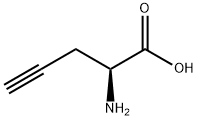
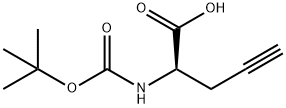
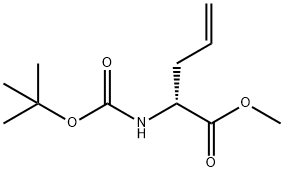
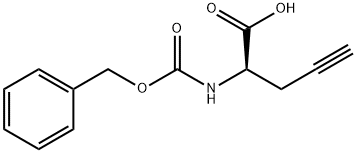
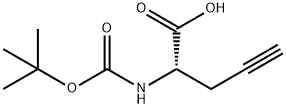
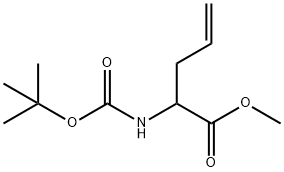
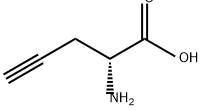
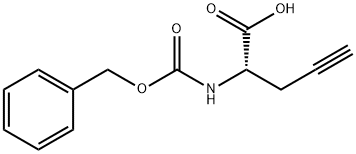
You may like
-
 DL-Propargylglycine CAS 64165-64-6View Details
DL-Propargylglycine CAS 64165-64-6View Details
64165-64-6 -
 2033-24-1 98%View Details
2033-24-1 98%View Details
2033-24-1 -
 1975-50-4 98%View Details
1975-50-4 98%View Details
1975-50-4 -
 2-HYDROXY BENZYL ALCOHOL 98%View Details
2-HYDROXY BENZYL ALCOHOL 98%View Details
90-01-7 -
 2-Chloro-1,3-Bis(Dimethylamino)Trimethinium Hexafluorophosphate 221615-75-4 98%View Details
2-Chloro-1,3-Bis(Dimethylamino)Trimethinium Hexafluorophosphate 221615-75-4 98%View Details
221615-75-4 -
 61397-56-6 CIS BROMO BENZOATE 98%View Details
61397-56-6 CIS BROMO BENZOATE 98%View Details
61397-56-6 -
 14714-50-2 (2-Hydroxyphenyl)acetonitrile 98+View Details
14714-50-2 (2-Hydroxyphenyl)acetonitrile 98+View Details
14714-50-2 -
 118753-70-1 98+View Details
118753-70-1 98+View Details
118753-70-1